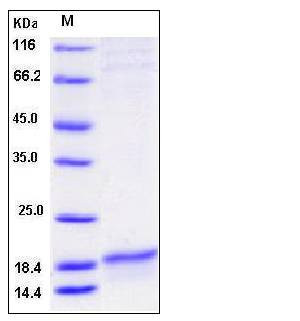Human SLPI Protein (His Tag)
ALK1,ALP,BLPI,HUSI,HUSI-I,MPI,WAP4,WFDC4
- 100ug (NPP2505) Please inquiry
| Catalog Number | P10343-H07B |
|---|---|
| Organism Species | Human |
| Host | Baculovirus-Insect Cells |
| Synonyms | ALK1,ALP,BLPI,HUSI,HUSI-I,MPI,WAP4,WFDC4 |
| Molecular Weight | The recombinant human SLPI consists of 126 amino acids and predicts a molecular mass of 14 kDa. It migrates as an approximately 19 kDa band in SDS-PAGE under reducing conditions. |
| predicted N | Met |
| SDS-PAGE |  |
| Purity | > 84 % as determined by SDS-PAGE |
| Protein Construction | A DNA sequence encoding the secreted form of human SLPI (P03973) (Ser 26-Ala 132) was expressed, with a polyhistidine tag at the N-terminus. |
| Bio-activity | Measured by its ability to inhibit trypsin cleavage of a fluorogenic peptide substrate, Mca-RPKPVE-Nval-WRK (Dnp)-NH2 (Catalog # ES002). The IC50 value is <4 Nm. |
| Research Area | Cardiovascular |Atherosclerosis |Vascular Inflammation |Leukocyte recruitment |Other in Leukocyte recruitment |
| Formulation | Lyophilized from sterile 20mM Tris, 500mM NaCl, pH 7.4, 10% gly 1. Normally 5 % - 8 % trehalose and mannitol are added as protectants before lyophilization. Specific concentrations are included in the hardcopy of COA. |
| Background | Secretory leukoprotease inhibitor (SLPI), also called antileukoprotease (ALP), is a 12-kDa, nonglycosylated serine protease inhibitor present in mucous secretions. It is thought to play a role in protecting the mucosae from injury associated with inflammation. SLPI is locally produced by serous cells, including bronchial submucosal glands. Elafin and SLPI are members of larger families of proteins secreted predominantly at mucosal sites, and have been shown to be modulated in multiple pathological conditions. Elafin and SLPI are structurally related in that both have a fold with a four-disulfide core or whey acidic protein (WAP) domain responsible for inhibiting proteases. SLPI is a prominent innate immune protein of the respiratory tract, possessing serine protease inhibitor activity, antibacterial activity, and anti-inflammatory/immunomodulatory activity. |
| Reference |
